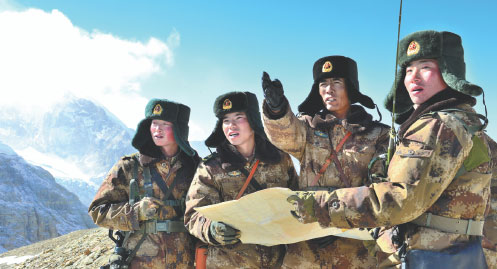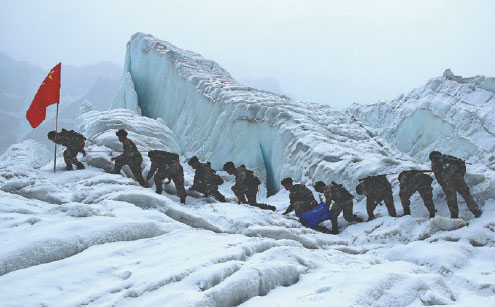Border soldiers reveal their higher calling
Updated: 2015-09-04 07:10
By Li Yang(China Daily USA)
|
||||||||
|
Soldiers from the border post in Tranglung, Gamba county, in the Tibet autonomous region, inspect the terrain during a patrol. These young men, who live 4,500 meters above sea level and battle the harsh climate and poor standard of living, have forged strong bonds of mutual trust and interdependence. Provided to China Daily |
|
Soldiers from the Tranglung border post on patrol on a glacier. In the 54 years since the establishment of the border guard, 31 soldiers have died at the mountain stations. Provided to China Daily |
Life is tough for the men who guard China's mountainous border with India, high on the hinterland of Tibet. Despite the constant dangers posed by the harsh high-altitude conditions, the soldiers' strong sense of camaraderie and the friendship of the local people have led many to regard the barren, windswept landscape as a second home. Li Yang reports from Gamba county in the Tibet autonomous region.
Their lives are even harder than the yaks'," said Chokyi, during her weekly visit to a border post halfway up a mountain 2 kilometers from her home in Tranglung, Gamba county.
A border defense company of the People's Liberation Army has been stationed at the post in the Tibet autonomous region - about 20 kilometers from China's border with India - since 1961.
Chokyi, who like many people from the Tibetan ethnic group has only one name, often brings the soldiers homemade Tibetan butter tea and highland barley flour. "It feels as though I'm calling on my own sons," she said.
The 60-something herdswoman has known almost every soldier in the company since the first day the "young men" came to the barren mountain - Tranglung means "windy place" in Tibetan - where wild winds batter the hillsides more than 200 days a year, carrying sand and small stones that sting the eyes.
Chokyi's life was saved by a medical officer in 1961. After that her mother, Lhakyi, visited the guard post to deliver gifts of homemade food and drinks. When she was asked why she visited the troops regularly for 53 years, right up until the last day of her life, Lhakyi, who died in 2013 at age 83, always said: "It was Chairman Mao who sent the young man to save my daughter. These young men are far from their mothers and they protect our lives with their own."
Chokyi said that when she dies, her daughter will continue the tradition and deliver gifts to the soldiers.
Help in adversity
Some of the village children treated by the company's medical officers share the same name - Sangye Tsering, meaning "Revolutionary longevity" - in appreciation of the army's help.
Apart from providing regular physical checkups and medical services, the army helps the villagers to harvest barley in autumn, search for lost yaks in the winter snow and rain and provides assistance during earth tremors and heavy snowfalls.
The troops teach the children to read, write and do basic arithmetic, and also they demonstrate how to plant vegetables that were unknown to the semi-nomadic herders before 2007, when a soldier first succeeded in growing peppers and eggplants.
The first vegetables were grown in a flowerpot, but later the troops constructed half-submerged greenhouses near their barracks where they cultivate more than 20 types of vegetables, as well as strawberries, cherry tomatoes, watermelons and honeydew melons.
"Vegetables and fruits greatly diversify the sources of nutrition for the Tibetan people, who only ate yak meat and barley before," said Chimed, an official at the county government.
Konchok Lhawang, a Tibetan soldier in his early 20s who has signed on for five years, said: "
Chokyi and Lhakyi's visits really relieved our homesickness. The villagers' hospitality makes us feel as though Trang-lung is our second home."
The strong bond of brotherhood among the young men - most of whom are only children, born in the 1980s and 90s, and from outside Tibet - is a type of magic that makes the guard post more like home.
- Another corruption suspect repatriated from US to China
- Shanghai slaps three-year ban on entertainers caught doing drugs
- 37 students critical after botched fire drill in NW China
- Man writes Chinese calligraphy using kitchenware
- Brilliant Autumn Urumqi feasting many eyes
- Kids serve as traffic police in C China
- EU pushes through plan to relocate 120,000 refugees amid oppositions
- China, Malaysia conclude first joint military exercise
- Hillary Clinton opposes controversial oil pipeline
- Washington zoo's panda cub growing up
- World leaders to gather at annual UN meeting
- Tsipras returns to fight for Greek economy
-
 Xi visits assembly line of plane manufacturer Boeing in US
Xi visits assembly line of plane manufacturer Boeing in US -
 First Lady tours Fred Hutchson Cancer Research Center
First Lady tours Fred Hutchson Cancer Research Center 
 Boeing to sell 300 planes to China
Boeing to sell 300 planes to China-
 Sino-US ties need more understanding: Xi
Sino-US ties need more understanding: Xi -
 Xi calls for closer cooperation with Washington state
Xi calls for closer cooperation with Washington state -
 Special: President Xi visits the US, attends UN summits
Special: President Xi visits the US, attends UN summits 
 How Chinese tourists and students contribute to the US economy
How Chinese tourists and students contribute to the US economy
 Fun stuff you can't miss about China-US exchanges
Fun stuff you can't miss about China-US exchanges
Most Viewed
Editor's Picks

|

|

|

|

|

|
Today's Top News
Young people from US look forward to Xi's state visit: Survey
US to accept more refugees than planned
Li calls on State-owned firms to tap more global markets
Apple's iOS App Store suffers first major attack
Japan enacts new security laws to overturn postwar pacifism
Court catalogs schools' violent crimes
'Beauty of Beijing's alleys akin to a wise, old person'
China makes progress fighting domestic, international cyber crime
US Weekly

|

|









